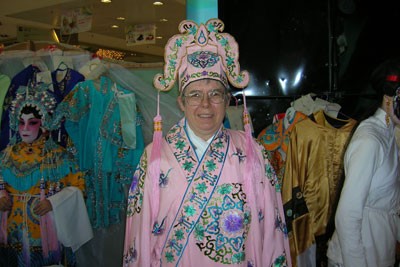In Human Ecology's Hong Kong exchange program, space and the future take on new meanings for Ithaca students
By Sheri Hall
The neon-lit streets of Hong Kong are packed with people. The city, known for its close living quarters and countless restaurants serving a blend of Asian and Western foods, is certainly worlds apart from Ithaca.
Faculty and students from the College of Human Ecology have been getting a taste of this steamy metropolis through HumEc's two-year-old exchange program in China. Students and researchers in the Departments of Fiber Science & Apparel Design (FSAD) and Design and Environmental Analysis (DEA) are studying and working at Hong Kong's Polytechnic University (PolyU). Next semester, PolyU students will travel to Ithaca. The rationale? Asia is the future.
In fashion and textiles, Asia is pushing the boundaries of design and is the global center for manufacturing, making it an important destination for students interested in the apparel industry, said Susan Ashdown, professor of FSAD.
"I tell my students that Paris, London and Italy are great places to look at the history of our field, but Hong Kong is where you go to learn about the future," Ashdown said.
For interior design students, the construction industry in Hong Kong is on the cutting edge of design, as well. "With the global economy, Asia is unparalleled in its impact on the built environment," said Kathleen Gibson, associate professor of DEA. "It's an area of the world that's booming, and for our students to be involved in this transition and make contacts there is invaluable."
Since the relationship with PolyU was launched in 2006, five Human Ecology students have studied there and eight PolyU students have come to Cornell. Ashdown has traveled to PolyU twice to collaborate on research projects; Gibson made the journey last summer for an international design program; and assistant professor of FSAD Juan Hinestroza has lectured there and will return in April and August to work on developing ultralight textiles that use nanotechnology to retain heat. He is also hosting Jintu Fan, a world-renowned textile researcher from PolyU, as a visiting scholar at Cornell.
The partnership between the two colleges is a great fit because they offer similar programs. "Very few schools have both interior design and fashion and apparel in their curriculum," Gibson said, or a world-class fiber science program and apparel design – a combination that is found at few universities around the world.
In fall 2006, Sara Patterson '08 was the first Human Ecology student to study at PolyU. Although the classes were in English, she found that her professors looked at design differently.
"That was the most interesting part about being there – to study in the same field, but become aware of different cultural perspectives about design," she said. "Because there is so much less space in Hong Kong, they make much more effective use of the spaces they have. I also found the designs to be more modern and more aesthetically pleasing."
Subsequently, four DEA students spent six weeks in a summer program at PolyU working in cross-cultural teams to design futuristic rooms for Shangri-La Hotels and Resorts, and currently Cornell is hosting six PolyU students.
Like the other visiting Chinese students, Cory Huang is overwhelmed by the spaces in America. "In Hong Kong, we use every bit of space because everything is so precious," she said. "In a design, for every inch we calculate how much it costs. Budget is very important. Here, there is more room for creativity because you have the space."
But, notes Gibson, "this is just the beginning. I'm sure there will be many more opportunities and connections between both institutions. We're planning on a long-term relationship."
A generous donation from Alice Woo, HumEc M.S. '75, helped to make the exchange program possible.
Sheri Hall is assistant director of communications for the College of Human Ecology.
Media Contact
Get Cornell news delivered right to your inbox.
Subscribe